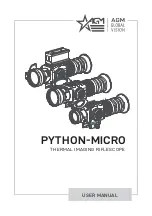
10
hand controller to “N” if you live in the northern hemisphere, or
“S” if you live in the southern hemisphere. When you flip the
power switch, the power indicator light on the mount will glow
red and the power indicator light on the hand controller will
glow green. Your mount will now be moving at the sidereal
rate, which is the same rate as the sky’s apparent motion. If
the mount is properly polar aligned, the mount will be “track-
ng” the motion of astronomical objects as the Earth rotates.
To move your telescope to a new object, loosen both the R.A.
and Dec. lock levers and move the telescope until it is pointed
in the general direction of the object you wish to view. Retighten
the R.A and Dec. lock levers. To center the object in the eye-
piece’s field of view, you will need to use the hand controller.
There are four pushbuttons on the hand controller. If no but-
tons are pushed, the R.A. motor will turn on the R.A. axis at
sidereal rate to track the motion of the night sky. The left and
right buttons move the mount about its R.A. axis, and the up
and down buttons move the mount about its Dec. axis. The
rate of speed is determined by the rate switch at the top right
of the hand controller. If the switch is at the 2x position, the
mount will move at two times sidereal rate when the right hand
button is pushed, which will cause objects to viewed in the
eyepiece to move slowly eastward. If the left button is pushed,
the drive will stop turning, which will cause objects in the eye-
piece to move slowly westward. The top and bottom bottoms
will cause the telescope to move north and south in Declina-
tion at the 2x speed. Similarly, if the rate switch is at the 8x or
16x position, the mount will move eight times or sixteen times
sidereal rate when a button is pushed.
The 2x sidereal rate is the best setting for making guiding cor-
rections during long-exposure astrophotography. The 8x and
16x rates are best for centering an object within the tele-
scope’s eyepiece or finder scope.
Note that whenever any of the four buttons on the hand con-
troller are pressed, the LED in the center of the controller will
shine red; when the button is released, the LED will be green.
Also, when the LED starts to blink at a constant rate, its time
to change the batteries in the battery pack.
Using the R.A. and Dec. Reversal Switches
On the side of the hand controller, there are two reversal
switches, one for the R.A. axis, and one for the Dec. axis.
When these switches are flipped to the “REV” setting, the
function of the pushbuttons on the hand controller will be
reversed. The reversal switches allow you to orient the push-
buttons to the direction of the apparent movement of a guide
star in a guide scope for astrophotography.
Understanding the Setting Circles
The setting circles on an equatorial mount (Figure 12) enable
you to locate celestial objects by their “celestial coordinates”.
Every object resides in a specific location on the “celestial
sphere”. That location is denoted by two numbers: its right
ascension (R.A.) and declination (Dec.). In the same way,
every location on Earth can be described by its longitude and
latitude. Right ascension is similar to longitude on Earth, and
declination is similar to latitude. The R.A. and Dec. values for
celestial objects can be found in any star atlas or star catalog.
The R.A. setting circle is scaled in hours, from 1 through 24,
with small marks in between representing 10-minute incre-
ments (there are 60 minutes in 1 hour of right ascension). The
lower set of numbers apply to viewing in the Northern
Hemisphere, while the numbers above them apply to viewing
in the Southern Hemisphere.
The Dec. setting circle is scaled in degrees, with each mark
representing 2° increments. Values of declination coordinates
range from +90° to -90°. The 0° mark indicates the celestial
equator. When the telescope is pointed north of the celestial
equator, values of the declination setting circle are positive;
when the telescope is pointed south of the celestial equator,
values of the declination setting circle are negative.
So, the coordinates for the Orion Nebula listed in a star atlas
will look like this:
R.A. 5h 35.4m Dec. –5° 27'
That’s 5 hours and 35.4 minutes in right ascension, and -5
degrees and 27 arc-minutes in declination (there are 60 arc-
minutes in 1 degree of declination).
Before you can use the setting circles to locate objects, the
mount must be accurately polar aligned, and the setting cir-
cles must be calibrated.
Calibrating the Declination Setting Circle
1. Loosen the Dec. lock lever and position the telescope as
accurately as possible in declination so it is parallel to the
R.A. axis as shown in Figure 7. Re-tighten the lock lever.
2. Loosen one of the thumbscrews on the Dec. setting circle,
this will allow the setting circle to rotate freely. Rotate the
Figure 12.
The R.A. and Dec. setting circles.
Dec. setting circle
Dec. setting circle
thumbscrew (2)
Dec. indicator arrow
R.A. setting circle
R.A. indicator arrow
R.A. setting circle
thumbscrew
(2)































